- Home
- Michael Swanwick
Radio Waves
Radio Waves Read online
Radio Waves
Michael Swanwick
michael Swanwick
Radio Waves
I was walking the telephone wires upside-down, the sky underfoot cold and fiat with a few hard bright stars sparsely scattered about it, when I thought how it would take only an instant's weakness to step off to the side and fall up forever into the night. A kind of wildness entered me then and I began to run.
Electric Motors-Controls-Parts. Then, where the slope steepened, along the curving snake of rowhouses that went the full quarter mile up to the Ridge. Twice I overtook pedestrians, hunched and bundled, heads doggedly down, out on incomprehensible errands. They didn't notice me, of course. They never do. The antenna farm was visible from here. I could see the Seven Sisters spangled with red lights, dependent on the earth like stalactites. "Where are you running to, little one?" one tower whispered in a crackling, staticky voice. I think it was Hegemone.
"Fuck off," I said without slackening my pace, and they all chuckled.
Cars mumbled by. This was ravine country, however built up, and the far side of the road, too steep and rocky for development, was given over to trees and garbage. Ham.burger wrappings and white plastic trash bags rustled in their wake. I was running full-out now.
About a block or so from the Ridge, I stumbled and almost fell. I slapped an arm across a telephone pole and just managed to catch myself in time. Aghast at my own carelessness, I hung there, dizzy and alarmed. The ground overhead was black as black, an iron roof, yet somehow was as anxious as a hound to leap upon me, crush me flat, smear me to nothingness. I stared up at it, horrified.
Somebody screamed my name.
I turned. A faint blue figure clung to a television antenna atop a small, stuccoed brick duplex. Charlie's Widow. She pointed an arm that flickered with silver fire down Ripka Street. I slewed about to see what was coming after me.
It was the Corpsegrinder.
When it saw that I'd spotted it, it put out several more legs, extended a quilled head, and raised a howl that bounced off the Heaviside layer. My nonexistent blood chilled.In a panic, I scrambled up and ran toward the Ridge and safety. I had a squat in the old Roxy, and once I was through the wall, the Corpsegrinder would not follow. Why this should be so, I did not know. But you learn the rules if you want to survive.
I ran. In the back of my head I could hear the Seven Sisters clucking and gossiping to each other, radiating television and radio over a few dozen frequencies. Indifferent to my plight.
The Corpsegrinder churned up the wires on a hundred needle-sharp legs. I could feel the ion surge it kicked up pushing against me as I reached the intersection of Ridge and Leverington. Cars were pulling up to the pumps at the Atlantic station. Teenagers stood in front of the A-Plus Mini Market, flicking half-smoked cigarettes into the street, stamping their feet like colts, and waiting for something to happen. I couldn't help feeling a great longing disdain for them. Every last one worried about grades and drugs and zits, and all the while snugly barricaded within hulking fortresses of flesh.
I was scant yards from home. The Roxy was a big old movie palace, fallen into disrepair and semiconverted to a skateboarding rink which had gone out of business almost immediately. But it had been a wonderful place once, and the terra-cotta trim was still there: ribbons and river-gods, great puffing faces with panpipes, guitars, flowers, wyverns. I crossed the Ridge on a dead telephone wire, spider-web delicate but still usable.
Almost there.
Then the creature was upon me, with a howl of electromagnetic rage that silenced even the Sisters for an instant. It slammed into my side, a storm of razors and diamond-edged fury, hooks and claws extended.
I grabbed at a rusty flange on the side of the Roxy.
Too late! Pain exploded within me, a sheet of white nausea. All in an instant I lost the name of my second daughter, an April morning when the world was new and I was five, a smoky string of all-nighters in Rensselaer Polytech, the jowly grin of Old Whatsisface the German who lived on LaFountain Street, the fresh pain of a sprained ankle out back of a Banana Republic warehouse, fishing off a yellow rubber raft with my old man on Lake Champlain. All gone, these and a thousand things more, sucked away, crushed to nothing, beyond retrieval.
Furious as any wounded animal, I fought back. Foul bits of substance splattered under my fist. The Corpse-grinder reared up to smash me down, and I scrabbled desperately away. Something tore and gave.
Then I was through the wall and safe and among the bats and gloom.
"Cobb!" the Corpsegrinder shouted. It lashed wildly back and forth, scouring the brick walls with limbs and teeth, as restless as a March wind, as unpredictable as ball lightning.
For the moment I was safe. But it had seized a part of me, tortured it, and made it a part of itself. I could no longer delude myself into thinking it was simply going to go away. "Cahawahawbb!" It broke my name down to a chord of overlapping tones. It had an ugly, muddy voice. I felt dirtied just listening to it. "Caw--" A pause. "--awbb!"
In a horrified daze I stumbled up the Roxy's curving patterned-tin roof until I found a section free of bats. Exhausted and dispirited, I slumped down.
"Caw aw aw awb buh buh!"
How had the thing found me? I'd thought I'd left it behind in Manhattan. Had my flight across the high-tension lines left a trail of some kind? Maybe. Then again, it might have some special connection with me. To follow me here it must have passed by easier prey. Which implied it had a grudge against me. Maybe I'd known the Corpse-grinder back when it was human. We could once have been important to each other. We might have been lovers. It was possible. The world is a stranger place than I used to believe.
The horror of my existence overtook me then, an acute awareness of the squalor in which I dwelt, the danger which surrounded me, and the dark mystery informing my universe. I wept for all that I had lost.
Eventually, the sun rose up like God's own Peterbilt and with a triumphant blare of chromed trumpets, gently sent all of us creatures of the night to sleep.
When you die, the first thing that happens is that the world turns upside-down. You feel an overwhelming disorientation and a strange sensation that's not quite pain as the last strands connecting you to your body part, and then you slip out of physical being and fall from the planet.
As you fall, you attenuate. Your substance expands and thins, glowing more and more faintly as you pick up speed. So far as can be told, it's a process that doesn't ever stop. Fainter, thinner, colder ... until you've merged into the substance of everyone else who's ever died, spread perfectly uniformly through the universal vacuum forever moving toward but never arriving at absolute zero. Look hard, and the sky is full of the Dead.
Not everyone falls away. Some few are fast-thinking or lucky enough to maintain a tenuous hold on earthly existence. I was one of the lucky ones. I was working late one night on a proposal when I had my heart attack. The office was empty. The ceiling had a wire mesh within the plaster and that's what saved me.
The first response to death is denial. This can't be happening, I thought. I gaped up at the floor where my body had fallen and would lie undiscovered until morning. My own corpse, pale and bloodless, wearing a corporate tie and sleeveless gray Angora sweater. Gold Rolex, Sharper Image desk accessories, and of course I also thought: I died for this? By which of course I meant my entire life.
So it was in a state of personal and ontological crisis that I wandered across the ceiling to the location of an old pneumatic message tube, removed and plastered over some 50 years be-fore. I fell from the seventeenth to the twenty-fifth floor, and I learned a lot in the process. Shaken, startled, and already beginning to assume the wariness that the afterlife requires, I went to a window to get a glimpse of the outer wor
ld. When I tried to touch the glass, my hand went right through. I jerked back. Cautiously, I leaned forward so that my head stuck out into the night.
What a wonderful experience Times Square is when you're dead! There is ten times the light a living being sees. All metal things vibrate with inner life. Electric wires are thin scratches in the air. Neon sings. The world is filled with strange sights and cries. Everything shifts from beauty to beauty.
Something that looked like a cross between a dragon and a wisp of smoke was feeding in the Square. But it was lost among so many wonders that I gave it no particular thought.
Night again. I awoke with Led Zeppelin playing in the back of my head. Stairway to Heaven. Again. It can be a long wait between Dead Milkmen cuts.
"Wakey-risey, little man," crooned one of the Sisters. It was funny how sometimes they took a close personal interest in our doings, and other times ignored us completely. "This is Euphrosyne with the red-eye weather report. The outlook is moody with a chance of existential despair. You won't be going outside tonight if you know what's good for you. There'll be lightning within the hour."
"It's too late in the year for lightning," I said.
"Oh dear. Should I inform the weather?"
By now I was beginning to realize that what I had taken on awakening to be the Corpsegrinder's dark aura was actually the high-pressure front of an approaching storm. The first drops of rain pattered on the roof. Wind skirled and the rain grew stronger. Thunder growled in the distance. "Why don't you just go fuck your--"
A light laugh that trilled up into the supersonic, and she was gone.
I was listening to the rain underfoot when a lightning bolt screamed into existence, turning me inside-out for the briefest instant then cartwheeling gleefully into oblivion. In the instant of restoration following the bolt, the walls were transparent and all the world made of glass, its secrets available to be snooped out. But before comprehension was possible, the walls opaqued again and the lightning's malevolent aftermath faded like a madman's smile in the night.
Through it all the Seven Sisters were laughing and singing, screaming with joy whenever a lightning bolt flashed, and making up nonsense poems from howls, whistles, and static. During a momentary lull, the flat hum of a carrier wave filled my head. Phaenna, by the feel of her. But instead of her voice, I heard only the sound of fearful sobs.
"Widow?" I said. "Is that you?"
"She can't hear you," Phaenna purred. "You're lucky I'm here to bring you up to speed. A lightning bolt hit the transformer outside her house. It was bound to happen sooner or later. Your Nemesis--the one you call the Corpsegrinder, such a cute nickname, by the way--has her trapped."
This was making no sense at all. "Why would the Corpsegrinder be after her?"
"Why why why why?" Phaenna sang, a snatch of some pop ballad or other.
"You didn't get answers when you were alive, what makes you think you'd get any now?" The sobbing went on and on. "She can sit it out," I said. "The Corpsegrinder can't--hey, wait. Didn't they just wire her house for cable? I'm trying to picture it. Phone lines on one side, electric on the other, cable. She can slip out on his blind side."
The sobs lessened and then rose in a most un-Widow like wail of despair.
"Typical," Phaenna said. "You haven't the slightest notion of what you're talking about. The lightning stroke has altered your little pet. Go out and see for yourself." My hackles rose. "You know damned good and well that I can't--"
Phaenna's attention shifted and the carrier beam died. The Seven Sisters are fickle that way. This time, though, it was just as well. No way was I going out there to face that monstrosity. I couldn't. And I was grateful not to have to admit it.
For a long while I sat thinking about the Corpsegrinder. Even here, protected by the strong walls of the Roxy, the mere thought of it was paralyzing. I tried to imagine what Charlie's Widow was going through, separated from this monster by only a thin curtain of brick and stucco. Feeling the hard radiation of its malice and need ... It was beyond my powers of visualization. Eventually I gave up and thought instead about my first meeting with the Widow.
She was coming down the hill from Roxborough with her arms out, the inverted image of a child playing a tightrope walker. Placing one foot ahead of the other with deliberate concentration, scanning the wire before her so cautiously that she was less than a block away when she saw me.
She screamed.
Then she was running straight at me. My back was to the transformer station--there was no place to flee. I shrank away as she stumbled to a halt.
"It's you!" she cried. "Oh God, Charlie, I knew you'd come back for me, I waited so long but I never doubted you, never, we can--" She lunged forward as if to hug me. Our eyes met. All the joy in her died.
"Oh," she said. "It's not you." I was fresh off the high-tension lines, still vibrating with energy and fear. My mind was a blaze of contradictions. I could remember almost nothing of my post-death existence. Fragments, bits of advice from the old dead, a horrifying confrontation with ... something, some creature or phenomenon that had driven me to flee Manhattan. Whether it was this event or the fearsome voltage of that radiant highway that had scoured me of experience, I did not know. "It's me," I protested.
"No, it's not." Her gaze was unflatteringly frank. "You're not Charlie and you never were. You're--just the sad remnant of what once was a man, and not a very good one at that." She turned away. She was leaving me! In my confusion, I felt such a despair as I had never known before.
"Please ... " I said.
She stopped.
A long silence. Then what in a livingwoman would have been a sigh. "You'd think that I--well, never mind." She offered her hand, and when I would not take it, said, "This way."
I followed her down Main Street, through the shallow canyon of the business district to a diner at the edge of town. It was across from Hubcap Heaven and an automotive junkyard bordered it on two sides. The diner was closed. We settled down on the ceiling.
"That's where the car ended up after I died," she said, gesturing toward the junkyard. "It Was right after I got the call about Charlie. I stayed up drinking and after a while it occurred to me that maybe they were wrong, they'd made some sort of horrible mistake and he wasn't really dead, you know?
Like maybe he was in a coma or something, some horrible kind of misdiagnosis, they'd gotten him confused with somebody else, who knows? Terrible things happen in hospitals. They make mistakes.
"I decided I had to go and straighten things out. There wasn't time to make coffee so I went to the medicine cabinet and gulped down a bunch of pills at random, figuring something among them would keep me awake. Then I jumped into the car and started off for Colorado."
"My God."
"I have no idea how fast I was going--everything was a blur when I crashed. At least I didn't take anybody with me, thank the Lord. There was this one horrible moment of confusion and pain and rage and then I found myself lying on the floor of the car with my corpse just inches beneath me on the underside of the roof." She was silent for a moment. "My first impulse was to crawl out the window. Lucky for me I didn't." Another pause. "It took me most of a night to work my way out of the yard. I had to go from wreck to wreck. There were these gaps to jump. It was a nightmare."
"I'm amazed you had the presence of mind to stay in the car."
"Dying sobers you up fast."
I laughed. I couldn't help it. And without the slightest hesitation, she joined right in with me. It was a fine warm moment, the first I'd had since I didn't know when. The two of us set each other off, laughing louder and louder, our merriment heterodyning until it filled every television screen for a mile around with snow.
My defenses were down. She reached out and took my hand.
Memory flooded me. It was her first date with Charlie. He was an electrician. Her next-door neighbor was having the place rehabbed. She'd been working in the back yard and he struck up a conversation. Then he asked her out. They
went to a disco in the Adam's Mark over on City Line Avenue.
She wasn't eager to get involved with somebody just then. She was still recovering from a hellish affair with a married man who'd thought that since he wasn't available for anything permanent, that made her his property. But when Charlie suggested they go out to the car for some coke--it was the Seventies--she'd said sure. He was going to put the moves on her sooner or later. Might as welt get it settled early so they'd have more time for dancing.
But after they'd done up the lines, Charlie had shocked her by taking her hands in his and kissing them. She worked for a Bucks County pottery in those days and her hands were rough and red. She was very sensitive about them.
"Beautiful hands," he murmured. "Such beautiful, beautiful hands."
"You're making fun of me," she protested, hurt.
"No! These are hands that do things, and they've been shaped by the things they've done. The way stones in a stream are shaped by the water that passes over them. The way tools are shaped by their work. A hammer is beautiful, if it's a good hammer, and your hands are, too."
He could have been scamming her. But something in his voice, his manner, said no, he really meant it. She squeezed his hands and saw that they were beautiful, too. Suddenly she was glad she hadn't gone off the pill when she broke up with Daniel. She started to cry. Her date looked alarmed and baffled. But she couldn't stop. All the tears she hadn't cried in the past two years came pouring out of her, unstoppable.
Charlie-boy, she thought, you just got lucky.
All this in an instant. I snatched my hands away, breaking contact. "Don't do that!" I cried. "Don't you ever touch me again!"
With flat disdain, the Widow said, "It wasn't pleasant for me either. But I had to see how much of your life you remember."
It was naive of me, but I was shocked to realize that the passage of memories had gone both ways. But before I could voice my outrage, she said, "There's not much left of you. You're only a fragment of a man, shreds and tatters, hardly anything. No wonder you're so frightened. You've got what Charlie calls a low signal-to-noise ratio. What happened in New York City almost destroyed you."

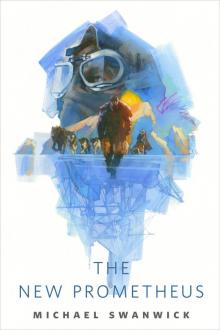 The New Prometheus
The New Prometheus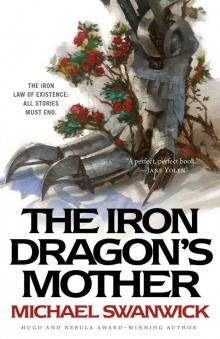 The Iron Dragon’s Mother
The Iron Dragon’s Mother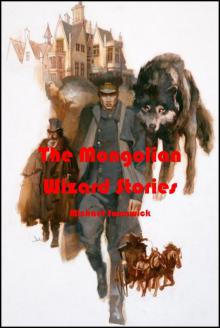 The Mongolian Wizard Stories
The Mongolian Wizard Stories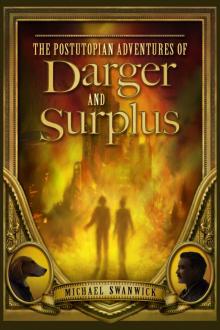 The Postutopian Adventures of Darger and Surplus
The Postutopian Adventures of Darger and Surplus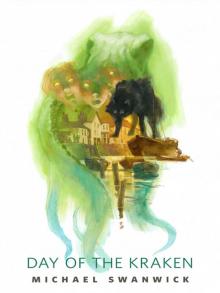 Day of the Kraken
Day of the Kraken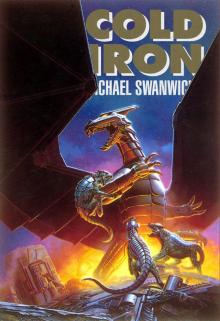 Cold Iron
Cold Iron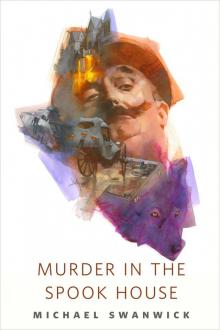 Murder in the Spook House: A Tor.com Original
Murder in the Spook House: A Tor.com Original Radio Waves
Radio Waves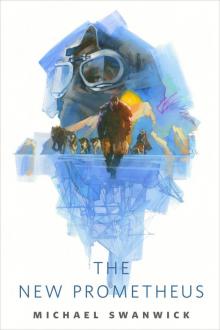 The New Prometheus: A Tor.com Original
The New Prometheus: A Tor.com Original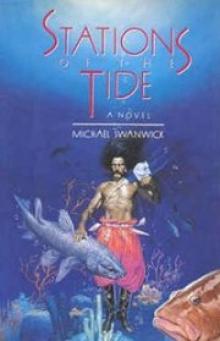 Stations of the Tide
Stations of the Tide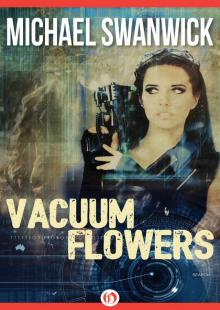 Vacuum Flowers
Vacuum Flowers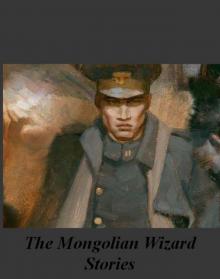 The Mongolian Wizard Stories (online stories 1-7)
The Mongolian Wizard Stories (online stories 1-7)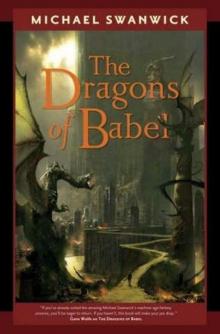 The Dragons of Babel
The Dragons of Babel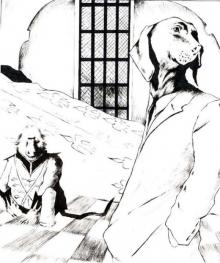 The Dog Said Bow-Wow
The Dog Said Bow-Wow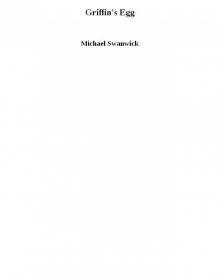 Griffin's Egg
Griffin's Egg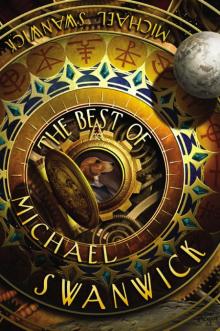 The Best of Michael Swanwick
The Best of Michael Swanwick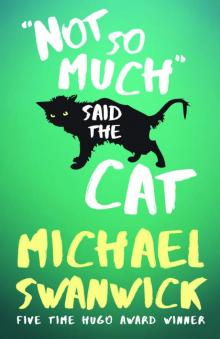 Not So Much, Said the Cat
Not So Much, Said the Cat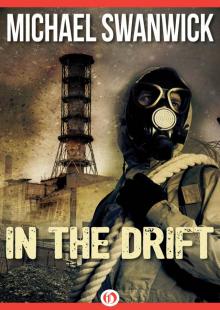 In the Drift
In the Drift Vacumn Flowers
Vacumn Flowers Slow Life
Slow Life The Wisdom Of Old Earth
The Wisdom Of Old Earth Legions In Time
Legions In Time Scherzo with Tyrannosaur
Scherzo with Tyrannosaur The Year's Best Science Fiction (2008 Edition)
The Year's Best Science Fiction (2008 Edition)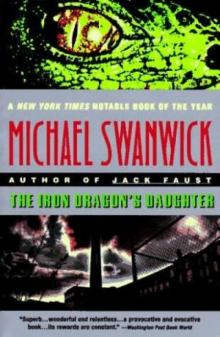 The Iron Dragon's Daughter
The Iron Dragon's Daughter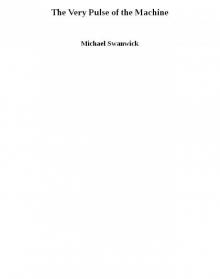 The Very Pulse of the Machine
The Very Pulse of the Machine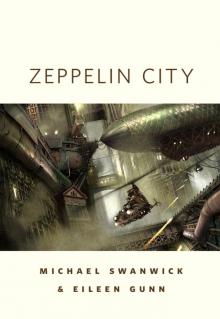 Zeppelin City
Zeppelin City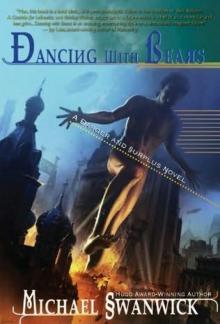 Dancing with Bears
Dancing with Bears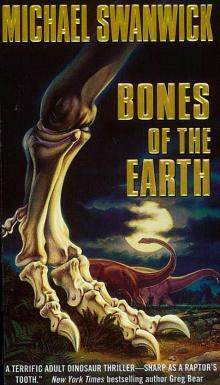 Bones of the Earth
Bones of the Earth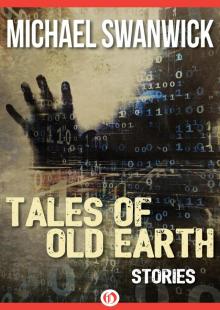 Tales of Old Earth
Tales of Old Earth Trojan Horse
Trojan Horse Radiant Doors
Radiant Doors